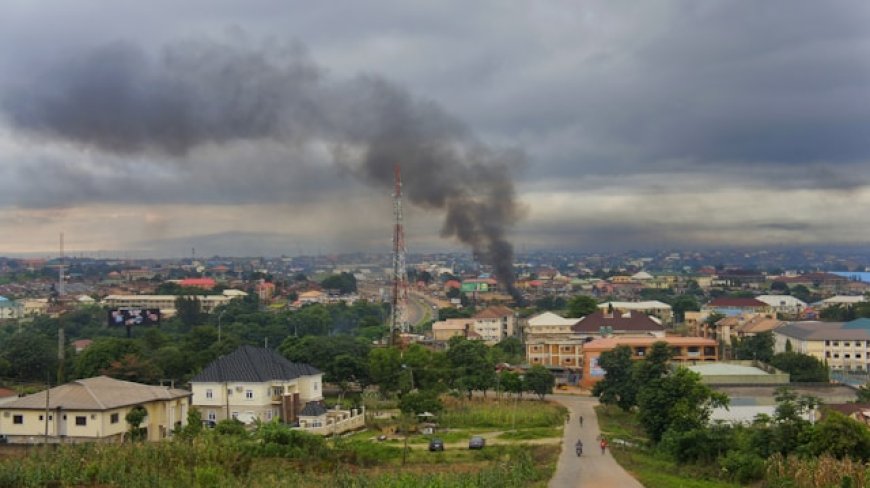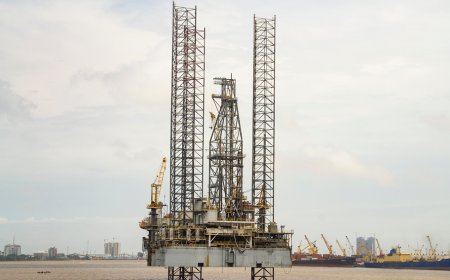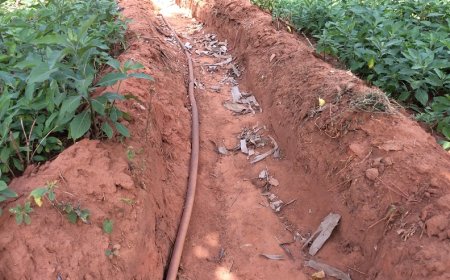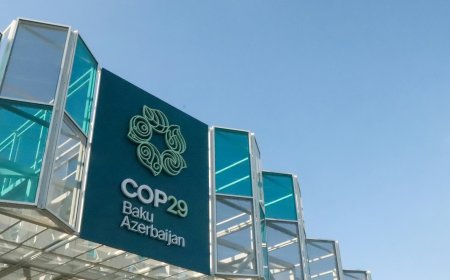Summary
- Methane's global warming potential is more than 80 times that of carbon dioxide over a 20-year period,1 making it a critical target for rapid climate action.
- Reducing methane emissions from Nigeria's oil and gas sector can yield immediate climate benefits, enhance public health and drive economic development.
- The oil and gas industry can quickly and cost-effectively reduce methane emissions using established leak detection and repair (LDAR) technologies and best practices.
- Initiatives by the Nigerian government, supported by international organisations like the Clean Air Task Force, have led to significant progress in methane reduction policies and capacity building.
- Nigeria's methane mitigation and reduction strategies, including the new methane guidelines, the Nigeria Gas Flare Tracker and the prototype Satellite-based Methane Emission Tracker set a precedent for other African nations and demonstrate a strong commitment to achieving sustainability goals.
- Collaboration is crucial in accelerating methane mitigation, as it unites stakeholders, shares resources and expertise, and drives innovative solutions for significant and sustained environmental impact.
Although methane has a much shorter atmospheric lifetime than carbon dioxide (approximately 12 years vs. centuries), it has over 80 times the global warming potential over a 20-year period, making it a crucial target for immediate climate action. This is a unique opportunity: By cutting methane emissions, we can achieve more immediate climate benefits compared to carbon dioxide reductions. This buys time for broader, long-term strategies aimed at reducing carbon dioxide and other greenhouse gasses.
In the oil and gas industry, methane is released during the extraction, production and transportation of fossil fuels. This sector contributes approximately 25% of global methane emissions.2 While agriculture, primarily through enteric fermentation in livestock, and waste management practices in landfills are also major contributors, the oil and gas sector presents a unique opportunity for substantial and immediate emission reductions. This is due to the availability of proven methane-reduction technologies and practices that can be implemented quickly and cost-effectively across the sector. Unlike agricultural methane emissions, which are more diffuse and harder to control, methane leaks in the oil and gas sector can be identified and addressed more directly. Technologies for leak detection and repair (LDAR) are well-established and can be deployed with relative ease. Implementing best practices such as regular maintenance, improving equipment and rolling out advanced monitoring systems can also significantly reduce emissions. There are also financial incentives to these actions. For example, captured methane can be sold as natural gas. These interventions not only help mitigate climate change but also improve operational efficiency. Thus, prioritising methane reduction in the oil and gas sector is a strategic and economically sensible approach to achieving significant climate benefits in the short term while complementing broader, long-term efforts across other sectors.
In 2021, the US, UK and EU jointly introduced the Global Methane Pledge (GMP), an international initiative aimed at reducing global methane emissions by 30% by 2030.3 This pledge, the most significant global effort to address methane emissions, has garnered extensive support, with over 155 country participants, including Nigeria, committing to the cause.4 Nigeria, with assistance from the Clean Air Task Force (CATF), has since taken concrete steps to play a key role in the worldwide effort to reduce methane emissions. Supported by the Climate and Clean Air Coalition (CCAC), CATF began its engagement in Nigeria in 2019, collaborating closely with the government to organise capacity-building workshops and small working groups.5 These initiatives aimed to improve Nigeria’s national methane emissions inventory and establish a foundation for comprehensive policy development. These collaborative efforts have led to significant achievements. In 2021, Nigeria included a specific methane reduction target of 61% for the oil and gas sector in its updated Nationally Determined Contribution (NDC). At COP27 in 2022, the Nigerian Upstream Petroleum Regulatory Commission (NUPRC) released its methane guidelines, marking a crucial step toward substantial emissions reduction in the upstream oil and gas sector. Nigeria’s methane guidelines are the first of their kind in the African oil and gas sector.
Alongside the efforts of the NUPRC in methane mitigation within the oil and gas sector, Nigeria’s National Council on Climate Change (NCCC) is adopting a whole-of-government approach. Inaugurated in 2022 as the national designated authority and official focal point for addressing climate change impacts, the NCCC coordinates methane mitigation across all sectors, fulfilling its mandate as Nigeria’s apex climate regulator and Global Methane Champion.6 This comprehensive strategy has Nigeria’s NDC targets in its sights. In the oil and gas sector specifically, other key government entities, such as the Department of Climate Change (DCC) in the Federal Ministry of Environment, are collaborating with the Africa Policy Research Institute (APRI) to reduce methane emissions. Together, DCC and APRI have organised a stakeholder engagement event to provide a comprehensive analysis of methane mitigation across the sector. Examining national priorities, stakeholder roles and financing landscapes,7 the event also evaluates the related challenges and opportunities within Nigeria’s climate change policies.
Currently, Nigeria’s oil and gas sector, like its counterparts worldwide, faces the dual challenge of exploiting its energy resources while minimising environmental impacts. The sector’s contribution to the economy is substantial, but so are its greenhouse gas emissions, particularly methane. The introduction of Nigeria’s methane regulations marks a critical advancement in addressing these environmental concerns. Nevertheless, the path to effective implementation is fraught with hurdles, including a lack of sufficient investment in monitoring and mitigation technologies such as advanced LDAR systems and regulatory complexities that require robust frameworks and consistent enforcement. The dynamic nature of the oil and gas industry therefore necessitates strategies that can adapt to changing conditions while balancing the dual goals of economic viability and environmental stewardship. Overcoming these challenges demands a multidimensional approach that integrates technological, regulatory, economic, and geopolitical considerations.
While the challenges are clear, they present significant opportunities for innovation, collaboration and transformative change. Embracing emerging technologies can lead to more effective and efficient methane mitigation strategies. In the short term, for example, the Nigerian oil and gas sector can enhance its efforts by improving monitoring and reporting mechanisms to ensure accurate data on methane emissions. For instance, advancements in remote sensing and real-time monitoring can drastically improve the detection and repair of methane leaks. Promoting the adoption of best practices, such as advanced LDAR, and incentivising emissions reduction initiatives are crucial steps that can accelerate progress. To showcase Nigeria’s dedication to addressing gas flaring, for example, in 2018 the National Oil Spill Detection and Response Agency (NOSDRA), the oil and gas sector’s environmental regulator, launched the Nigerian Gas Flare Tracker (NGFT). The NGFT offers a transparent tool for measuring gas flaring and emissions from both onshore and offshore oil and gas operations. NOSDRA is now developing a prototype for a Satellite-based Methane Emission Tracker (SMET) to serve as an independent tool for the measurement, reporting and verification (MRV) of emissions.8 This strategic initiative aims to create a nationally accepted, transformational data tool to detect, measure and quantify methane emissions for regulatory purposes. These measures not only contribute to immediate reductions but also lay the foundation for long-term sustainability.
In terms of collaboration, the fostering of partnerships between industry players, government bodies and international organisations facilitates the sharing of knowledge, resources and best practices, accelerating progress in methane reduction. These joint initiatives have already begun to bear fruit in the form of capacity-building workshops, policy development and the establishment of a national methane emissions inventory. The Nigerian government’s collaboration with APRI has yielded significant research on methane mitigation. Their initial findings can help guide stakeholders in addressing policy implementation challenges related to achieving mitigation targets. Through this partnership, NOSDRA has announced plans to convene an inaugural event focusing on quarterly reporting of efforts and initiatives aimed at reducing carbon footprints.9 To demonstrate the seriousness of the initiative, an event was held on May 23, 2024, seeking the cooperation of stakeholders in the oil and gas industry, particularly those in the upstream sector. During the event, the Nigerian Minister of State for the Environment disclosed that since 2016, 1.621 billion metric tonnes of gas worth USD 5.654 billion has been flared in Nigeria.10 The Minister emphasised that this flaring resulted in the emission of 86 million metric tonnes of carbon dioxide and 31.3 million tonnes of methane into the atmosphere. The Nigerian government is committed to changing this scenario in line with its policy to end gas flaring by 2030. This initiative demonstrates a commitment to turning words into action, ensuring that industry stakeholders make clear commitments with tracked timelines for accountability. It will also facilitate the measurement and evaluation of change management, technology transition and adaptation plans.
In the longer term, strategies should focus on investments in research and development to explore innovative technologies and methods for methane reduction. Establishing policy frameworks that incentivise low-emission practices will drive the industry towards cleaner operations. Robust enforcement mechanisms will be essential to ensure compliance with these policies and regulations. Such a strategic approach will create a more sustainable and environmentally responsible oil and gas sector in Nigeria, aligning with global climate goals. Even more importantly, engaging stakeholders across the value chain is crucial for achieving sustained impact in methane reduction. To that effect, collaboration between government, industry and civil society can foster a shared commitment to environmental stewardship.
In this regard, environmental scientists have issued an early warning to the oil and gas regulatory bodies, emphasising the importance of these organisations working closely together, especially if they are to proactively address the impacts of the EU’s planned sanctions on methane emissions, which are not directly part of the GMP but align with its objectives. For instance, the following observations have been made:
- Due to the new EU regulations, Nigeria is under pressure to reduce and mitigate methane emissions from its oil and gas industry. Nigeria’s current efforts to curb gas flaring are inadequate, especially when coupled with the longstanding environmental degradation from oil and gas operations.
- The EU’s limit on fossil fuel imports from 2030 adds urgency to Nigeria’s target to reduce and mitigate methane emissions from the oil and gas industry operations. This is because it is primarily methane emissions from gas flaring that have detrimental effects on human health and contribute to climate change.
- Nigeria’s reliance on gas flaring during operations, inefficient gas monetisation efforts and skewed enforcement of environmental regulatory compliance worsens the issue of actual reduction and mitigation efforts.
- The new EU regulations pose a significant threat to Nigeria’s economic ties in the energy sector. Non-compliance can result in penalties and threaten trade relations with the EU.
- If emission levels are not effectively managed, the introduction of new EU import standards may pose regulatory risks to Nigeria’s Liquified Natural Gas (LNG) exports. Nigeria’s LNG investments drive may therefore face risks in the areas of competitiveness and cost efficiency, market demand and price volatility, stranded assets, long-term economic planning, investment and economic stability, scenario-based planning, and environmental and regulatory considerations.
In light of these concerns, the Federal Government of Nigeria should prioritise environmental sustainability by adopting best practices in methane mitigation. This can be achieved through (i) demonstrating compliance with international standards to safeguard targeted market access and (ii) restructuring regulation into a coherent policy implementation framework.
In conclusion, achieving a sustainable pathway for methane mitigation and reduction in Nigeria’s oil and gas sector requires concerted efforts and strategic foresight. The current challenges, such as technological limitations and regulatory complexities, must be addressed. This involves not only implementing effective monitoring and reporting systems, but also ensuring that regulatory measures are consistently enforced. Seizing opportunities for innovation is equally crucial. Meanwhile, the ability to tailor strategies according to new insights and changing circumstances will be critical for long-term success. Charting a clear course of action will therefore require collaboration, commitment and continuous adaptation from stakeholders across the value chain, whether they are government entities, industry players or civil society. These parties’ adherence to best practices and regulatory requirements, as well as global climate goals, will drive progress and ensure a unified approach to methane mitigation. Taking these steps, while continuing to leverage international support and expertise, Nigeria will set a precedent for other African nations, leading the way towards a cleaner, more resilient energy future.
About the Authors
Dr. Mohammed Dahiru Aminu
Dr. Mohammed Dahiru Aminu serves as the Policy Manager for Methane Pollution Prevention in Africa at Clean Air Task Force, a globally renowned environmental organization dedicated to mitigating the severe impacts of climate change.
Dr. Mahmoud Ibrahim Mahmoud
Dr. Mahmoud Ibrahim Mahmoud is a Senior Climate Change Fellow working on Methane Mitigation and Reduction in Nigeria with the Africa Policy Research Institute (APRI).
Dr. Grace Mbungu
Dr. Grace Mbungu is a Senior Fellow and Head of the Climate Change Program at APRI – Africa Policy Research Institute.
Endnotes
- Methane emissions are driving climate change. Here’s how to reduce them. (2021, August 20). United Nations Environmental Program. https://www.unep.org/news-and-stories/story/methane-emissions-are-driving-climate-change-heres-how-reduce-them
- CCAC Secretariat. (2022, February 3). Large releases of methane from oil and gas production detected from space. Climate & Clean Air Coalition. https://www.ccacoalition.org/news/large-releases-methane-oil-and-gas-production-detected-space
- Aminu, M. D. (2024, January 30). Mastering methane: How Nigeria and Clean Air Task Force are taking on methane pollution together. Clean Air Task Force. https://www.catf.us/2024/01/mastering-methane-nigeria-clean-air-task-force-taking-methane-pollution-together/
- Fast action on methane to keep a 1.5 ℃ future within reach. (2024). Global Methane Pledge. https://www.globalmethanepledge.org/
- Ibid
CCAC Secretariat. (2023, September 26). Nigeria Begins Implementation of Oil and Gas Methane Reduction. Climate & Clean Air Coalition. https://www.ccacoalition.org/news/nigeria-begins-implementation-oil-and-gas-methane-reduction - Methane mitigation and reduction in Nigeria’s oil and gas sector. (2024, March 26). Africa Policy Research Private Institute APRI. https://afripoli.org/event/data/uploads/800922-apri-mmrp-nigeria-06a.pdf
- NOSDRA to develop satellite tracking tools for methane emissions. (2022). NOSDRA: Director General (DG) (Producer) https://www.youtube.com/watch?v=3wq3WmxMJ1I; Mahmoud, M. I. (2024, March 20). Methane Mitigation and Reduction in Nigeria’s Oil and Gas Sector. Africa Policy Research Institute. https://afripoli.org/methane-mitigation-and-reduction-in-nigerias-oil-and-gas-sector
- Methane mitigation and reduction in Nigeria’s oil and gas sector. (2024, March 26). Africa Policy Research Private Institute APRI. https://afripoli.org/event/data/uploads/800922-apri-mmrp-nigeria-06a.pdf
- Ramalan, I. (2024, May 24). Nigerian govt to end gas flaring by 2030 — Minister. Daily Nigerian. https://dailynigerian.com/nigerian-govt-gas-flaring/




